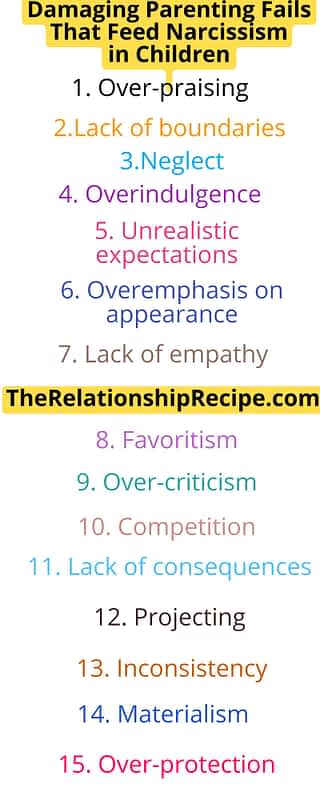15 Damaging Parenting Mistakes That Create Narcissism in Children
Most parents don’t realize it, but some of the most common parenting mistakes that create narcissism in children can slip into our routines without us even noticing. The word narcissist gets thrown around a lot these days, doesn’t it? Scroll through any relationship advice group and you’ll see it pop up in post after post. “My ex was a narc.” “My mother-in-law is textbook narcissist.” It’s enough to make you wonder if there are there really that many narcissists walking among us?

Key Highlights:
- 🚩How common parenting habits might unknowingly encourage narcissistic traits
- 🚩Why roles like “golden child” or “black sheep” can shape a child’s identity
- 🚩What neglect actually teaches kids about love and validation
- 🚩How discipline needs to change when empathy and entitlement collide
- 🚩What patterns to break if you want to raise emotionally balanced kids

Is Narcissism in Children Really That Common?
Probably not in the clinical sense. Most people won’t ever be diagnosed. But there’s no denying it: a whole lot of folks are walking around with some seriously narcissistic traits.
So…how does that happen? How does someone grow into a person who lacks empathy, craves constant praise, and bulldozes other people’s boundaries?
We know it starts in childhood. That part isn’t shocking. But here’s the harder question: how much of that starts with us as parents?
✋Before you take a guilt trip, stop. This isn’t shaming or finger-pointing. Parenting is ridiculously hard. Most of us are doing the best we can with what we know, and a whole lot of what we were taught wasn’t great either.
But if we’re brave enough to look at some of the parenting mistakes that create narcissism, we can break the cycle. We can learn. We can do better for our kids, and for the people they’ll grow up to become.
Today we’ll discuss common parenting mistakes that create narcissism in children so you can catch them early, change course, and raise emotionally grounded, kind humans.
How Parenting Mistakes Can Create a Narcissistic Child
There are always layers: social pressure, peer influences, emotional wiring, and sometimes plain bad luck. Still, it’s worth asking hard questions, especially when it comes to possible parenting mistakes that cause narcissism.
🚀Parenting is a wild ride. It can be beautiful, exhausting, humbling. We all slip up. But some mistakes, if repeated or left unchecked, can shape how a child sees themselves and how they treat others. And in some cases, those missteps might just plant the early seeds of narcissism in children.
In this article, we’ll unpack whether parenting really can lead to a narcissistic child, how these traits develop over time, and what parents can do differently if they start to notice the signs.

Are Narcissistic Children Caused by Parenting?
Narcissism shows up as more than just confidence; it’s a deep need to feel important, to be admired constantly, and often, with a struggle to truly care about other people’s feelings. While a child’s personality is shaped by a mix of things, genetics, life experiences, and environment, parenting does play a big part. It’s not that parents cause narcissism directly, but certain parenting mistakes that cause narcissism can quietly feed the roots of these traits over time.

15 Parenting Mistakes That Create a Narcissistic Child
Several factors can contribute to the development of narcissism in children:
1. Over-praising: Constantly showering a child with praise and admiration can create an unrealistic sense of self-importance, which can lead to narcissistic tendencies.
2. Lack of boundaries: Failing to set and enforce appropriate boundaries can make a child believe they are entitled to special treatment and that rules do not apply to them.
3. Neglect: Emotional or physical neglect can lead children to develop narcissistic traits as they seek to compensate for the lack of attention and care from their parents.
4. Overindulgence: Giving children everything they want without them having to earn it can create a sense of entitlement, a hallmark of narcissism.
5. Unrealistic expectations: Pushing a child too hard to achieve and succeed can lead to a constant need for validation and admiration.
6. Overemphasis on appearance: Focusing solely on a child’s physical appearance can contribute to a shallow self-identity and a reliance on external validation.
7. Lack of empathy: Parents who do not model or teach empathy may inadvertently encourage their children to disregard the feelings and needs of others.

8. Favoritism: Showing favoritism toward one child over others can create rivalry and potentially narcissistic behavior as children vie for attention and approval.
9. Over-criticism: Constant criticism can lead to an extreme fear of failure and a desire for perfection, often seen in narcissistic individuals.
10. Competition: Encouraging children to constantly compete with others can cultivate a mindset that prioritizes winning at all costs, often to the detriment of empathy and cooperation.
11. Lack of consequences: Failing to enforce consequences for misbehavior can lead children to believe they are immune to rules and accountability.
12. Projecting: Parents who project their own unfulfilled desires and ambitions onto their children can inadvertently encourage narcissistic traits.
13. Inconsistency: Inconsistent parenting can create confusion and instability, leading children to seek validation from external sources, such as social media.
14. Materialism: Overemphasizing material possessions and wealth can encourage children to equate their self-worth with their possessions.
15. Over-protection: Being overly protective can lead children to believe they are exceptionally fragile and important, creating narcissistic tendencies.

Can Parental Neglect Cause Narcissism?
Whether it’s emotional or physical, neglect can quietly shape the way a child sees themselves and the world around them. When kids don’t feel seen, loved, or cared for consistently, they often look outside themselves for validation, trying to fill that emotional gap however they can. Over time, this can show up as traits associated with narcissism, like entitlement, emotional distance, or a deep need for attention. It’s not blaming parents. Sometimes neglect isn’t intentional, but it does remind us how powerful presence and emotional connection really are.

Do Narcissistic Parents Put Kids into Roles That Turn Them into Narcissists Too?
Narcissistic parents can unintentionally set their children up to adopt patterns that mirror their own. In families like this, kids often get cast into roles, like the golden child, the black sheep, or the scapegoat, without even realizing it.
The golden child is often showered with praise and pressure to uphold the family’s image, which can create an inflated sense of self. And then there’s the black sheep, who’s often misunderstood or pushed to the margins. In their effort to reclaim a sense of worth and identity, they may overcompensate with self-focus, defensiveness, or a need to prove themselves, which can also lead to narcissistic behaviors.
Meanwhile, the scapegoat lives under constant criticism, and in their desperation to be seen or validated, may develop narcissistic traits of their own. It’s a painful dynamic that can shape a child’s identity in deep, lasting ways.

How to Discipline a Narcissistic Child
Disciplining a child with narcissistic traits isn’t about punishing them into humility, but guiding them toward emotional growth, empathy, and accountability. These children often struggle with criticism, entitlement, or a lack of awareness around how their actions affect others. Traditional discipline methods, especially those rooted in shame or control, can backfire, creating defensiveness or even reinforcing narcissistic behaviors.
Instead, the focus should be on firm boundaries, emotional development, and connection. Here are five compassionate, research-backed strategies to help you discipline in a way that nurtures emotional maturity:
✔️ Set Clear and Consistent Boundaries
Children with narcissistic tendencies often push limits, especially if they’ve learned that rules are flexible or only enforced sometimes. To counter this, make your boundaries crystal clear. Be calm but firm when explaining rules, and follow through with predictable consequences every time. Inconsistent discipline not only confuses kids—it also fuels entitlement.
✔️ Teach Empathy with Intentional Conversations
Narcissistic traits often include a lack of empathy, but that doesn’t mean it can’t be developed. Make space for conversations that highlight other people’s emotions. Ask reflective questions like, “How do you think your friend felt when that happened?” or “What would you want someone to do if they were in your shoes?” Practice this regularly, not just during conflict, so empathy becomes a muscle they build over time.
✔️ Promote Self-Reflection Without Shame
Self-awareness is the antidote to unconscious, reactive behavior. Instead of just calling out what your child did wrong, guide them toward seeing the why and how behind their actions. Help them explore their motives, the consequences of their choices, and how they might make different ones next time. Avoid harsh criticism; it tends to trigger defensiveness rather than growth.
✔️ Encourage Selflessness Through Action
Narcissistic children may naturally focus on themselves, but you can interrupt that cycle by introducing activities that require thinking about others. Volunteer together. Write thank-you notes. Encourage cooperative play or give them responsibilities that require care and teamwork. These real-world experiences help them feel the rewards of giving, not just receiving.
✔️ Seek Professional Help When Needed
If the behaviors are persistent, intense, or escalating, it’s wise to consult a child psychologist or therapist—especially someone with experience in narcissistic traits or emotional development. Therapy isn’t just for extreme cases; it can be a helpful space for your child to build tools like emotional regulation, resilience, and relational awareness.
💡Why Disciplining Narcissistic Children Requires a Different Lens
Children with narcissistic traits don’t respond well to humiliation, yelling, or punishments that undermine their sense of self – they either shut down or fight back harder. This is why a more mindful, emotionally intelligent approach matters so much. Discipline in this case isn’t just behavior correction; it’s about emotional reprogramming. You’re not trying to break their spirit; you’re teaching them how to take up space without stepping on others.
The goal isn’t perfection, it’s progress. With the right tools and a whole lot of patience, it is possible to raise emotionally aware, grounded children, even if they start out struggling with narcissistic tendencies.

Wrapping Up
Raising emotionally healthy kids is no small task, and none of us get it right all the time. By recognizing some of the parenting mistakes that create narcissism in children, we give ourselves a chance to change course with more intention and grace. This isn’t pointing fingers, it’s understanding, reflection, and breaking cycles as parents that don’t serve our children in the long run.
If you’ve spotted yourself in any of these habits, take a breath. Parenting is a lifelong process, and it’s never too late to change direction. The goal isn’t perfection – it’s connection. By choosing empathy, boundaries, and honest self-reflection, we can raise kids who feel valued without needing to seek constant validation… and who learn to value others, too.
Let’s keep doing the work: not just for them, but for the generation that follows.

Thank you for reading this post, don't forget to subscribe!







